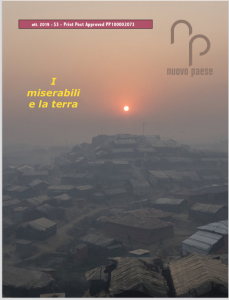nuovo paese ottobre, 2019
Difficoltà governative
I governi di tutto il mondo mostrano l’incapacità di prendersi cura delle proprie comunità.
Le attuali sfide, derivanti da problemi accumulati, contraddizioni radicate e disparità intrinseca, sono difficili da affrontare in particolare quando il capitale privato non è mai stato così influente e le leggi comuni non sono mai state così inefficaci.
Nonostante l’aumento della conoscenza tecnologica e la corrispondente produttività, l’economia non sembra offrire equità sociale o risanamento ambientale. Il sistema è truccato a favore del capitale privato e dei suoi proprietari privilegiati, e i segni lo stanno raccontando.
Secondo il think tank britannico High Pay Centre, il rapporto tra la retribuzione dell’amministratore delegato e quella dei lavoratori medi è passato da 48 a uno nel 1998 a 129 a uno nel 2016.
Negli Stati Uniti la stessa razione è passata da 42 a una nel 1980 a 347 a una nel 2017.
In Australia, l’amministratore delegato di Qantas Alan Joyce è stato in cima alla lista dei redditi alti nel 2018 portando a casa $ 23,9 milioni – che è più di 275 volte il salario medio a tempo pieno.
Secondo Carl Rhodes, vicedirettore della School of Business dell’Università della Tecnologia di Sydney, l’esplosione dei compensi dei dirigenti può essere ricondotta alle politiche del libero mercato che sostenevano il settore privato e la regolamentazione della luce.
Sebbene il commercio estero e l’immigrazione siano stati utili capri espiatori politici per economie calanti, sempre più il dito viene puntato su quello che a volte viene chiamato capitalismo di rendita.
È qui che l’affitto o il prezzo addebitato per beni e servizi è eccessivamente superiore al costo per per produrli.
I problemi che si presentano sono più che semplici costi di vita più elevati. Soffocano e bloccano l’economia reale, di cui si stima che oltre il 60% sia costituito dal consumo comunitario.
Chiaramente, è stato sbagliato riporre tanta fiducia nel libero mercato, ma non è chiaro come i governi risponderanno quando le loro economie non mantengono le promesse.
 Governing difficulties
Governing difficulties
Governments around the world are showing an inability to care for their communities.
Current challenges, from accumulated problems, entrenched contradictions and inherent disparity, are difficult to address particularly when private capital has never been so influential and common laws have never been so ineffectual.
Despite increased technological know how, and its corresponding productivity, the economy does not seem to be delivering social fairness or environmental reparation.
The system is rigged in favour of private capital and its privileged owners, and the signs are telling.
According to UK think tank the High Pay Centre the ratio of chief executive pay to that of average workers rose from 48 to one in 1998 to 129 to one in 2016. In the US the same ratio rose from 42 to one in 1980 to 347 to one in 2017.
In Australia, Qantas chief executive Alan Joyce topped the list of high earners in 2018 taking home $23.9 million — which is more than 275 times the full-time average wage.
According to Carl Rhodes, the deputy dean of the School of Business at the University of Technology Sydney, the explosion of executive pays can be traced back to free market policies that advocated for the private sector and light regulation.
Although foreign trade and immigration have been convenient political scapegoats for waning economies, increasingly the finger is being pointed at what is sometimes referred to as rentier capitalism. This is where the rent or price charged for goods and services is excessively higher than the cost of producing them.
The problems that arise are more than just higher living costs. They stifle and stunt the real economy of which more than 60% is estimated to be made up of community consumption.
Clearly, it has been wrong to place so much faith on the free market, but it is not clear how governments will respond when their economies are not delivering on promises.
